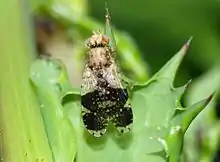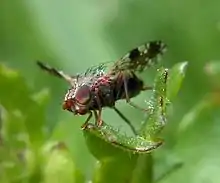Tephritis
Tephritis is a genus of flies. It contains around 170 described species, making it the sixth largest genus in the family Tephritidae.[1] Many more undescribed species are known from specimen collections.[2] Tephritis occur throughout much of the world, but most are Palearctic.[1] They can be found in a wide range of climate types, from hot semidesert to tundra.[3] Most species inhabit the inflorescences of plants from several tribes in the family Asteraceae, and a few species cause galls to form.[1][4]
| Tephritis | |
|---|---|
 | |
| Tephritis formosa | |
| Scientific classification | |
| Kingdom: | |
| Phylum: | |
| Class: | |
| Order: | |
| Family: | |
| Subfamily: | |
| Tribe: | Tephrellini |
| Genus: | Tephritis Latreille, 1804 |
| Type species | |
| Musca arnicae | |
| Synonyms | |
| |
Tephritis can be distinguished from other fruit flies of the Tephritinae by the arrangement of setae on their bodies, among other characters.[5]
Species
The genus Tephritis includes the following species:[6]
- T. academica Bassov & Tolstoguzova, 1994
- T. acanthiophilopsis Hering, 1938
- T. afra (Hering, 1941)
- T. afrostriata Korneyev, 2013[2]
- T. alini Hering, 1936
- T. amata Hering, 1938
- T. angulatofasciata Portschinsky, 1892
- T. angustipennis (Loew, 1844)
- T. annuliformis Wang, 1990
- T. araneosa (Coquillett, 1894)
- T. arizonaensis Quisenberry, 1951
- T. arnicae (Linnaeus, 1758)
- T. arsenii Korneyev et al., 2015[7]
- T. atocoptera Agarwal & Kapoor, 1988
- T. azari Namin & Korneyev, 2012[8]
- T. baccharis (Coquillett, 1894)
- T. bardanae (Schrank, 1803)
- T. bimaculata Freidberg, 1981
- T. biparitita Hendel, 1938
- T. brachyura Loew, 1869
- T. brunnea Hardy & Drew, 1996
- T. bushi Hardy & Drew, 1996
- T. californica Doane, 1899
- T. calliopsis Wang, 1990
- T. cameo Korneyev, 2013[2]
- T. candidipennis Foote, 1960
- T. carcassa Dirlbek & Dirlbekova, 1974
- T. cardualis Hardy, 1974
- T. carmen Hering, 1937
- T. cassiniae Malloch, 1931
- T. cincta (Loew, 1844)
- T. cinerea Munro, 1931
- T. cirsicola Hering, 1938
- T. collina Wang, 1990
- T. cometa (Loew, 1840)
- T. conflata Dirlbek & Dirlbek, 1995
- T. consimilis Chen, 1938
- T. consuta Wang, 1990
- T. conura (Loew, 1844)
- T. conyzifoliae Merz, 1992
- T. corolla Richter, 1975
- T. crepidis Hendel, 1927
- T. crinita Hering, 1961
- T. daedala Hardy, 1964
- T. darjeelingensis Agarwal, et al., 1992
- T. dentata Wang, 1990
- T. dilacerata (Loew, 1846)
- T. dioscurea (Loew, 1856)
- T. distigmata Hardy & Drew, 1996
- T. divisa Róndani, 1871
- T. dudichi Aczel, 1939
- T. duguma Dirlbek, 1975
- T. euarestelloides Richter, 1975
- T. fallax (Loew, 1844)
- T. fascigera Malloch, 1931
- T. femoralis Chen, 1938
- T. flaviventris Hering, 1938
- T. formosa (Loew, 1844)
- T. frauenfeldi Hendel, 1927
- T. furcata Hardy & Drew, 1996
- T. glaciatrix (Enderlein, 1934)
- T. gladius Korneyev, 2013[2]
- T. goberti Séguy, 1932
- T. heiseri Frauenfeld, 1865
- T. heliophila Hendel, 1927
- T. hemimelaena (Bezzi, 1920)
- T. hendeliana Hering, 1944
- T. hengduana Wang, 1990
- T. hesperia Hardy & Drew, 1996
- T. hospita Richter, 1975
- T. hungarica Hering, 1937
- T. hurvitzi Freidberg, 1981
- T. hyoscyami (Linnaeus, 1758)
- T. impunctata Shiraki, 1933
- T. jabeliae Freidberg, 1981
- T. joanae Goeden, 1993
- T. jocaste Hering, 1953
- T. kogardtauica Hering, 1944
- T. koreacola Kwon, 1985
- T. kovalevi Korneyev & Kameneva, 1990
- T. kukunoria Hendel, 1927
- T. labecula Foote, 1959
- T. leavittensis Blanc, 1979
- T. leontodontis (De Geer, )[4]
- T. ludhianaensis Agarwal & Kapoor, 1988
- T. luteipes Merz, 1992
- T. maccus Hering, 1937
- T. majuscula Hering & Ito, 1953
- T. marginata Malloch, 1931
- T. mariannae Merz, 1992
- T. matricariae (Loew, 1844)
- T. megalura Hering, 1938
- T. merzi Freidberg & Kütük, 2003[9]
- T. mesopotamica Korneyev & J.Dirlbek, 2000[10]
- T. michiganensis Quisenberry, 1951
- T. mixta (Walker, 1853)
- T. monapunctata Wang, 1990
- T. mongolica Hendel, 1927
- T. multiguttata (Becker, 1913)
- T. multiguttulata Hering, 1953
- T. mutabilis Merz, 1992
- T. nartshukovi Bassov & Tolstoguzova, 1994
- T. nebulosa (Becker, 1908)
- T. neesii (Meigen, )[4]
- T. nigricauda (Loew, 1856)
- T. obscuricornis Róndani, 1871
- T. ochroptera Korneyev, 2013[2]
- T. oedipus Hendel, 1927
- T. okera (Shinji, 1940)
- T. oligostictica Dirlbek & Dirlbek, 1971
- T. ovatipennis Foote, 1960
- T. ozaslani Kütük, Bayrak & Hayat, 2012[11]
- T. pallescens Hering, 1961
- T. palmeri Jenkins, 1989
- T. pantosticta Hardy & Drew, 1996
- T. pelia Schiner, 1868
- T. pentagonella (Bezzi, 1928)
- T. phaeostigma Hardy & Drew, 1996
- T. plebeia Malloch, 1931
- T. poenia (Walker, 1849)
- T. posis Hering, 1939
- T. postica (Loew, 1844)
- T. praecox (Loew, 1844)
- T. prolixa Hardy & Drew, 1996
- T. protrusa Hardy & Drew, 1996
- T. ptarmicae Hering, 1935
- T. pterostigma Chen, 1938
- T. pulchra (Loew, 1844)
- T. pumila Hardy & Drew, 1996
- T. puncta (Becker, 1908)
- T. pura (Loew, 1873)
- T. quasiprolixa Hardy & Drew, 1996
- T. rasa Séguy, 1934
- T. recurrens Loew, 1869
- T. robusta Korneyev, 2013[2]
- T. rufina Róndani, 1871
- T. rufipennis Doane, 1899
- T. ruralis (Loew, 1844)
- T. rydeni Hering, 1956
- T. sahandi Khaghaninia, et al., 2011[3]
- T. santolinae Hering, 1934
- T. sauterina Merz, 1994
- T. schelkovnikovi Zaitzev, 1945
- T. scitula (Wulp, 1900)
- T. scorzonerae Merz, 1993
- T. separata Róndani, 1871
- T. shansiana Chen, 1940
- T. signatipennis Foote, 1960
- T. simplex (Loew, 1844)
- T. sinensis Chen, 1940
- T. sinica (Wang, 1990)
- T. sonchina Hering, 1937
- T. spreta (Loew, 1861)
- T. stictica Loew, 1862
- T. stigmatica (Coquillett, 1899)
- T. subpura (Johnson, 1909)
- T. subradiata Wulp, 1900
- T. tanaceti Hering, 1956
- T. tasmaniae Hardy & Drew, 1996
- T. tatarica Portschinsky, 1892
- T. theryi Séguy, 1930
- T. thoracica Malloch, 1931
- T. triangula Ito, 1952
- T. truncata (Loew, 1844)
- T. trupanea Hardy & Drew, 1996
- T. trypaneina Hering, 1953
- T. umbrosa Dirlbek & Dirlbek, 1968
- T. urelliosomima Korneyev & J.Dirlbek, 2000[10]
- T. valida (Loew, 1858)
- T. variata (Becker, 1908)
- T. vespertina (Loew, 1844)
- T. volkovitshi (Richter, 1995)[3]
- T. webbii Doane, 1899
- T. wulpi Norrbom, 1999
- T. zernyi Hendel, 1927
References
- M. Kütük (2008). "A new species of Tephritis Latreille (Diptera: Tephritidae) from Turkey" (PDF). Belgian Journal of Zoology. 138 (2): 132–134.
- Korneyev, S. V. (2013). Revision of species of the genus Tephritis Latreille 1804 (Diptera: Tephritidae) with entire apical spot. Zootaxa 3620(1) 67-88.
- Khaghaninia, S., et al. (2011). A new species of Tephritis Latreille (Diptera: Tephritidae) with an unusual wing pattern from Iran and its taxonomic implications. Zootaxa 3047 54-62.
- White, I.M. (1984). Tephritid Flies (Diptera: Tephritidea). Handbooks for the Identification of British Insects. 10 pt 5a. Royal Entomological Society of London. pp. 134 pp. ISBN 978-0901546685.
- Zarghani, E., et al. (2010). Synopsis of the genus Tephritis Latreille (Diptera: Tephritidae) in Iran. Munis Entomology & Zoology 5, 1176-81.
- "Tephritis Latreille, 1804". Integrated Taxonomic Information System. Retrieved August 28, 2010.
- Korneyev S. V., Mohamadzade Namin S,. Khaganinia S., Zarghani E. (2015). Palearctic species of the genus Tephritis (Diptera, Tephritidae) associated with plants of the tribe Senecioneae (Asteraceae) — Zootaxa: 4007(2) 207–216
- Namin, S. M. and S. V. Korneyev. (2012). Tephritis azari, a new fruit fly (Diptera: Tephritidae) from Iran and Azerbaijan, with a key to the Tephritis maccus species group. Zootaxa 3590 79-85.
- Freidberg, A. and M. Kütük. (2002). A new species of Tephritis from Turkey, with a key to the species of the Tephritis pulchra group. Israel Journal of Zoology 48(4) 295-311.
- Korneyev, V. A. and J. Dirlbek. (2000). The fruit flies (Diptera: Tephritidae) of Syria, Jordan and Iraq. Studia Dipterologica 7(2) 463-82.
- Kütük, M., et al. (2012). A new species of Tephritis Latreille (Diptera: Tephritidae) from Turkey. Turk J Zool 36(4) 475-80.
This article is issued from Wikipedia. The text is licensed under Creative Commons - Attribution - Sharealike. Additional terms may apply for the media files.

